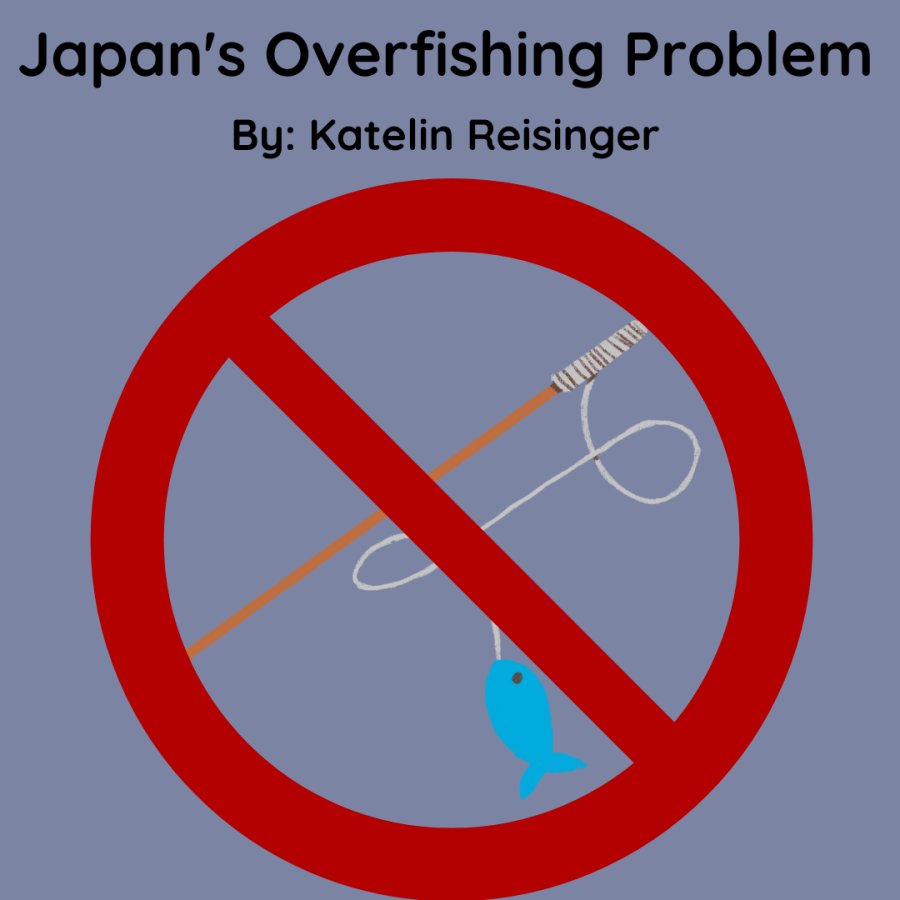Japan’s Overfishing Problem
November 7, 2022
The ocean doesn’t belong to any one country, it connects us on a global level. Someone in Europe could drop something in the water and it could end up on the other side of the world . This is one of the many reasons conservation of the oceans is so difficult. It is much easier to monitor the environment on a local level, but when it comes to the ocean, trash dropped in Asia hurts us here. This is why focusing on preservation on a global scale is so important. Yet one country with horrendous and unsustainable fishing practices has been flying under the raider for years: Japan. Despite presenting itself as an environmentally friendly country on the surface, a deep dive into their policies and practices, you can quickly see the hidden dark side of the country’s fishing industry.

The most grotesque practice to our western eye is the brutal murder of dolphins, this is because fisherman see them as being the reason as why their not catching fish . Every year an area of Japan called Taigi murders at least 20,000 dolphins. It also catches dolphins to sell them to marine parks for around $300,000 each. The Japanese government has released statements justifying these actions saying it is a traditional form of livelihood and funds the dolphin meat industry, with each dolphin selling for $600 each in this small industry. Dolphins aren’t the only animal the Japanese government has approved the slaughtering of. In 2019, they withdrew from an international whaling ban formed in 1986.

The Japanese government continued whaling even while agreeing to this ban, blatantly disrespecting the other countries involved. The government has approved for fishermen to catch Sei whales, which have a population of 80,000 (endangered), and Bryde whales, which have a population of 10,000-25,000 (critically endangered).
Sharks are also one of the highly affected species, they are caught for their valuable fins which are used for soup. This practice tends to be wasteful with the shark’s bodies being thrown back into the ocean after the fins have been harvested. These shark fins are cut off while they are still alive and thrown back into the ocean to die a slow and painful death. The other way these fins are cut is in an assembly line at docks of dead sharks getting the fins sliced off. Despite the Japanese government taking some minor actions, so minor that there was no information online, to help end this industry.
They are mainly for show. In the port of Kesennuma, more than 75 tons of blue sharks are layed on this dock and then finned on a daily basis. That is a little less than the weight of 6 semi-trucks. Despite the scary ways sharks are portrayed in movies, they are vital to the importance of the health of our oceans. If you are ever snorkeling and see a reef shark or any other species, that is a sign of a healthy ecosystem. They help regulate fish populations and keep our ocean living.

It is impossible to overlook the most obvious element of overfishing: the fish. Japan catches 10% of the world’s fish, this is solely through commercial fishing. 90% of Japanese fish are consumed in the country. The fish that has been gaining popularity in the news recently is the Bluefin Tuna. In a single day, 40 tons of fresh Bluefin tuna and 90 tons of frozen Bluefin tuna are sold. This is a combined 130 tons of Bluefin tuna in a single day. The constant stress put on the population has brought the species down to only 3% of what it was before. This has also brought the unaddressed issues of bycatch, this is when other marine animals that are unwanted are caught during commercial fishing. This added cost of fishing has caused the death of 300,000 dolphins and 273 million sharks every year.
The Japanese government’s efforts to curb this brutal industry are nominal at best. With a net profit of approximately 14.3 billion dollars, Japan is in no rush to impose this highly profitable industry. Facing no alternative, Japan imposed harsher policies in 2018. Yet they are still significantly behind Europe in enforcing said policies.









Who do you think i am??? • May 18, 2025 at 9:31 AM
Nice article!
I understand what you are trying to say in this article but what about China?
In japan people are consuming 3920000 tons in 2022(This is the newest data I had)
However in china they are taking 71160000 tons every year in 2023(also the newest data)
In the USA, they also have about 426 tons in 2022.
By the way Japan is a 12nd place when we look at how much fish we are fishing in 1 whole year.
Japan might be having too much fish, but i think you are being quite rude for Japan. Why are you not mentioning other countries like China, USA or something like that?
Jameson • Mar 10, 2025 at 8:12 PM
this is sooooooooooooooo well done and helped me for my project in school. THANK YOU!!! 🙂
TK • Sep 27, 2023 at 11:39 PM
You did a good job. Here in Japan people often say in the summer “Let’s eat nutritious eels to overcome summer heat!” Japanese people are not sane. They turn blind eye to the fact that Japanese eels are endangered.
Carolyn Keith Hopper • Aug 19, 2023 at 10:31 PM
Horribly , terribly, sad and worrisome!!!